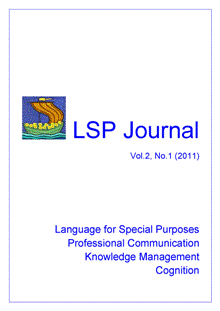Inter-subjectivity, cognition, nature and multimedia representations: modal categories in professional discourse
Abstract
Leading studies of the English modal auxiliaries generally classify the epistemic category as bearer of personal beliefs. Proposals that, when conveying quantitative properties and physical characteristics, this modal class may perform objective and alethic functions remain peripheral to the discussions. As a result, connotations which relate to physical evidence, conform to the epistemology, pragmatics and ethics of disciplinary domains and contribute to the woof and warp of professional or ‘multimedia genres’ abide unattended.
The study explores whether objective and alethic functions of epistemic modals may deserve attention in analyses of professional discourse. An outline of influential descriptions of modal categories reveals a common line in their conceptualisation of epistemic particles as bearers of subjective beliefs. The stance invites a reflection on the epistemico-pragmatic evolution which brought ‘beliefs’, in science, to depend on accessible evidence, mathematical models, inter-subjective knowledge and multimedia representations. Scholarly arguments follow which emphasise the epistemico-pragmatic grounds of ‘probability’ modals, in ‘possible worlds’ genres, and propose specifications of objective and alethic categories. The aims and ‘possible worlds’ relevant to scientific investigation and argumentation are briefly touched on. Then, evidence of two epistemico-pragmatic functions is offered through the characterisation of modals in texts of different realms of science.
The discussion indicates that in scientific reports epistemic modals bear connotations which must be worked out in light of verified knowledge. The latter is space/time-related, inter-subjective and bound to conceptual models and inter-disciplinary frames of reference. These specifications constitute alethic and objective meaning sources relevant to the practices of thought communities. Therefore, descriptive models of professional discourse might benefit if they were inclusive of the two pragmatic functions.



